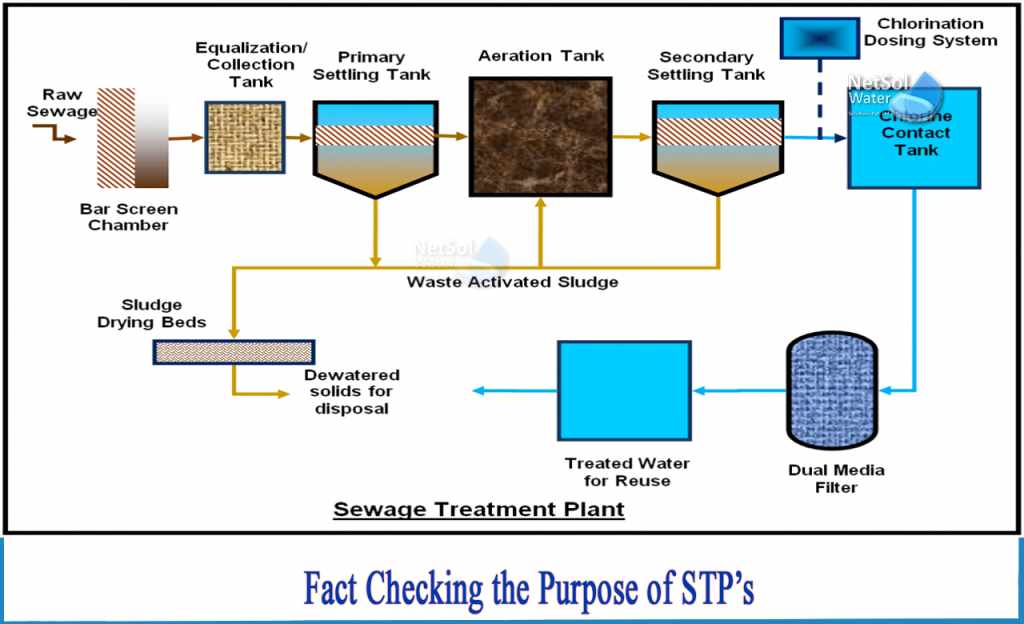
Off-mains sewage treatment plants give houses and commercial structures an alternative to using the public sewer network by safely disposing of wastewater at a lower cost and with less environmental impact.
They’re popular in rural communities because they’re self-sufficient, but their environmental benefits have made them desirable across the world. In particular places, sewage treatment plants may be necessary, especially since they produce a much cleaner waste discharge when compared to septic tanks.
In this post, our experts examine when and why you may need a sewage treatment plant.
What Are Sewage Treatment Plants?
Sewage treatment plants are an efficient method for wastewater and sewage to be safely broken down in your backyard or on the premises of a business.
When building garbage is removed from a structure, it’s sent through piping and into a sewage treatment plant, which is generally located outside. The sewage treatment plant then separates solids from liquids before microorganisms are used to break down hazardous chemicals in the wastewater.
A sewage treatment facility is powered by electricity, allowing fans to move the air in order for the breakdown process to occur. The end product is extremely clean and can frequently be discharged straight into a local watercourse or even recycled and reused after further treatment.
Why Would You Need a Sewage Treatment Plant Installed?
Sewage treatment plants, on the other hand, offer a slew of advantages over public sewers. Given their low cost and environmentally beneficial treatment method, they may be required in a variety of situations.
The following are the most common reasons for having a sewage treatment system put in on either a commercial or residential property:
- As an Off-Mains Sewer Solution
Sewage treatment plants provide a waste disposal option that is entirely separate from the public sewer system. They are very self-sufficient, thus they are one of the most popular choices for properties in rural areas that frequently lack access to public mains.
Sewage treatment plants also provide an alternative to costly sewage bills as a backup off-mains sewer solution. A large sewage treatment plant may actually be a sound long-term investment for organizations that pay hefty rates to the local government for these services on a big scale.
Sewage treatment plants, of course, require electricity to operate, but they may be easily connected to the municipal grid or even run by a generator.
- In Areas of Environmental Concern
After breaking down the germs in the waste that is pumped through the system, sewage treatment plants create a very clean effluent. After separating solids from fluids, liquids go through a rigorous purification process before being released from the system.
Many communities, especially in rural regions, are situated near watercourses that serve as sources of water supply for the community or in areas of natural beauty or environmental concern with fragile ecosystems.
When it comes to sewage, the first step in releasing it back into the environment is through treatment. Treatment plants generate wastewater that is clean and safe enough to be released into local waterways, without harming the environment or contaminating drinking water supplies.
If you’re considering investing in sewage treatment equipment, it’s important to understand the options. Businesses may choose to install sewage treatment systems over other waste disposal methods if they want to improve their environmental image and aid nearby ecosystems.
- If You Require Little Maintenance and Upkeep
In rural regions, sewage treatment plants are an excellent choice since they seldom require attention. The device is quite self-sufficient and just needs to be emptied once a year, along with a constant supply of power.
Once the system is in place, it can run smoothly for years as long as sludge does not build up inside the tanks. This not only lowers running costs, but it’s ideal for individuals who just want an off-mains sewage system without having to deal with anything too technical.
- If Minimal Odours Are Desired
Sewage treatment works are highly effective and self-contained, with little to no smell.
This is a significant benefit if your local sewage system is giving you issues or if you need to keep odours at bay in your house or company.
If you detect a stench, it’s an indication that you have a problem and should have it looked at. A sewage treatment plant shouldn’t produce any noxious odours, so if you notice one, there’s probably something wrong with it.
Sewage Treatment Plants vs. Septic Tanks
It’s critical to remember that sewage treatment plants are not the same thing as septic tanks. In fact, sewage treatment plants are frequently put in place after septic tanks do not fulfil the demands of the project.
Septic tanks function similarly, but they do not run on electricity and don’t produce as clean an effluent at the conclusion of the treatment process. If a property needs to displace wastewater directly into a nearby creek, many states require that it install a sewage treatment system rather than a septic tank.
Because the sewage treatment procedure is so much cleaner, wastewater can now be directed into local streams or sensitive locations. The wastewater from a septic tank, on the other hand, might harm drinking water and the environment by polluting it.
The small size of septic tanks is their main drawback. They are hard to scale up in size because they limit the capacity of a property or business. Commercial enterprises and bigger properties frequently discover that a sewage treatment plant is far more efficient at treating large quantities of waste than a septic tank would be.
OMDI’s sewage treatment plant design and installation, as well as maintenance, is just one of the services we provide. We have years of expertise designing, installing, and maintaining sewage treatment plants, as well as many other off-mains drainage and treatment solutions.
If you want to learn more about sewage treatment plants, our courteous and knowledgeable staff are here to assist you. For additional information and a free quote, contact OMDI.
